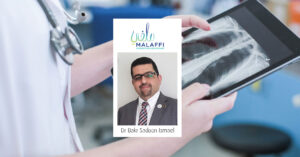By Dr. Bakr Sadoon Ismael, Ambulatory Healthcare Services Co, a SEHA System Facility Member of the Clinical Advisory Committee of Malaffi

The key theme for the 2020 World Allergy Week of ‘COVID-19 and allergy’ has generated a lot of debate within the global healthcare community. According to the World Allergy Organization (WAO), discussions for the week will focus on the critical issues currently affecting allergy and asthma patients, such as the importance of maintaining regular care during the COVID-19 pandemic, as well as the challenges that come with the similarity between certain allergy and asthma symptoms to those associated with COVID-19. For many healthcare providers and patients alike, the similarities can sometimes be misleading and may cause critical delays in necessary treatment.
Using data to mitigate critical delays
Malaffi, which is the region’s first Health Information Exchange (HIE) platform, and one of the key initiatives of the Department of Health – Abu Dhabi, connects all public and private healthcare providers in Abu Dhabi, allowing them to exchange important patient health information in real-time, and therefore establish a database of unified medical records. By accessing patients’ Electronic Medical Records (EMRs) through Malaffi, doctors can make better informed and more efficient clinical decisions, based on the patient’s allergy or asthma history (or lack thereof). They are also able to access other important information such as demographics, medication, laboratory and radiology results, previous procedures and past medical interactions, from consultation to emergency treatment.
Having access to this readily available information, allows the attending doctor to make the most informed, rapid diagnosis and treatment decisions, which can sometimes be critical, in determining whether a patient is presenting with symptoms of allergy or asthma, or have they potentially contracted COVID-19. The allergy information in Malaffi is also critical to ensure patient safety and adequate medication prescription and administration to avoid allergic reactions that can be detrimental.
It is very important to be able to determine the often-subtle difference of overlapping symptoms between allergies and asthma from those of COVID-19, in order to be able to diagnose and treat patients quickly and accordingly. While we are on high alert for COVID-19 symptoms, according to the Harvard Medical School, many people may just be experiencing their annual springtime tree pollen allergies. People may also just be experiencing a common cold. Mayo Clinic, highlights that COVID-19 causes fever, shortness of breath, difficulty breathing and potentially stomach upset. Seasonal allergies do not cause those symptoms, and typically present with itching, watery eyes, runny nose and sneezing.
A more concerted effort to manage the incidence of allergic emergencies
In the UAE, where over 14 per cent of residents have asthma, and up to one-fifth of the population is thought to suffer from some form of allergy, there is a collective call for a more concerted effort to manage incidences of allergic emergencies during the COVID-19 pandemic.
This is where data exchange really comes into play, through a coordinated and emirate-wide real-time exchange of allergy information to empower healthcare practitioners with the right information at the right time. Access to this data is also instrumental for doctors when conducting consultations via telemedicine, particularly during the pandemic, where testing cannot be carried out on the spot.
Data standardisation within EMRs is the way forward
In times of a pandemic such as COVID-19, having access to a large amount of EMR data is extremely important, but even more so when the data is standardised, allowing doctors to speak the same clinical language. When it comes to recording allergies in EMRs, the standardisation of how EMR systems capture allergies, brings immeasurable value. It can make all the difference between prescribing a medication that will cause an allergic reaction and one that won’t. This can be lifesaving, especially in an emergency.
There is a pressing need to have standardised allergy terminology in EMR systems, which could be in the form of a drop-down menu which doctors can choose from to simplify the data inputting process and facilitate the exchange of critical patient information. This will allow doctors to provide specific and detailed information about the reaction the patient has experienced and record the allergens or trigger that caused the reaction in a structured format, rather than using a free text field that is currently standard in some EMR systems
This type of coding and information recording will significantly improve data quality and support patient diagnoses, medical decision-making, and as a result, the management of the condition through the choice of more appropriate medication that will avoid severe preventable side effects. Lastly, this will allow for the information to be interoperable across EMRs and easily accessible.
With the establishment of Malaffi within Abu Dhabi, the journey of embracing digital transformation by healthcare providers through the recording, access and exchange of important patient information from multiple EMRs, is a potential lifesaver in the management of allergic emergencies during the COVID-19 pandemic.
Fortunately, the pandemic has only accelerated all these efforts. We are now in an even better position to reap the benefits of technology to improve healthcare in every respect, especially when it comes to empowering healthcare providers to utilise data to make more informed choices, in times when speed and accuracy are critical and can truly help save lives.
















